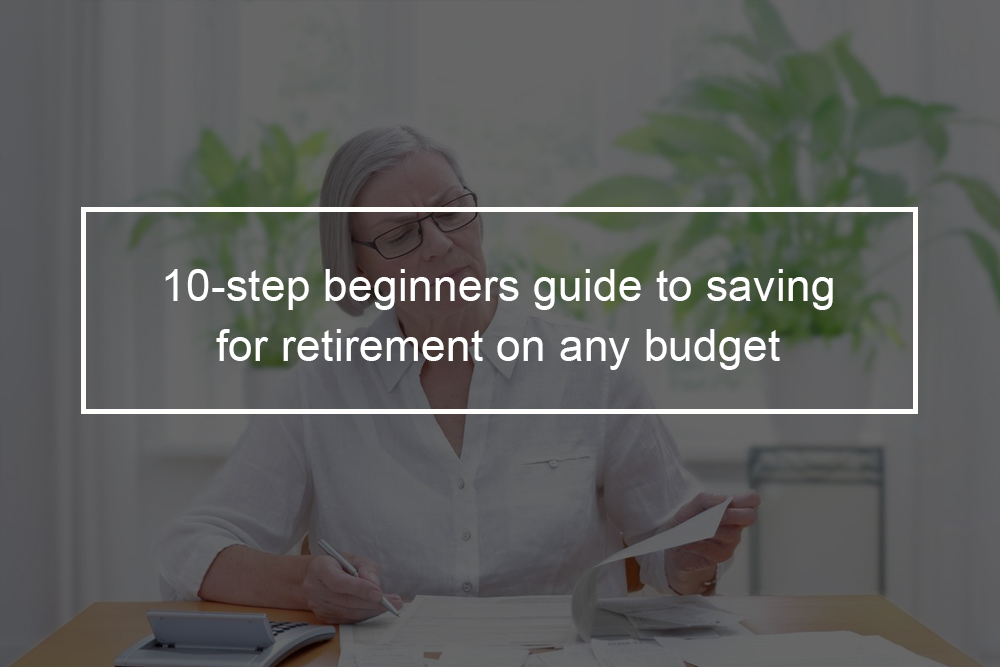We all know it is essential to save for retirement. And still, there are many people without a single dollar in their nest egg. According to research, nearly half of Americans are not saving for retirement. And even those people who save for retirement are not saving enough. That is a problem! The good news is that most people are thinking about saving for retirement. However, wishing without action is just a pipe dream. You need to do something different if you want your habits- and your future- to change! The truth is, saving money for retirement is easier than you think.
How to start saving for retirement in ten steps?
Focus on starting to save today
Particularly if you are just beginning to put money away for retirement, start saving and investing as much as you can today. Also, let compound interest- the ability of your assets to generate earnings, which are reinvested to generate their own earnings- have a chance to work in your favor. The more you can invest when you are young, the better off you will be.
Starting to save early may help results, even investing a small amount. By beginning to put away money more ahead, a twenty-five-year-old investing $75 monthly accumulates more assets by age sixty-five than if he or she had started to invest $100 monthly at age thirty-five despite investing less each time. Investing a lesser dollar amount over a long period horizon can have a greater impact on investment results than investing a larger dollar amount for a shorter period.
Start small
The personal-finance field is set up to cater to those who have considerable wealth-virtually each bank, and brokerage would rather deal with ten millionaires than 10,000 people with $1,000 each. Nonetheless, your savings and retirement plans should be based on what meets your needs, not those of the financiers. On that note, even $250 or even $500 in retirement savings is a worthwhile start. Any savings establishes a behavior and the process. There are various brokers now that provide no-minimum, no-fee retirement accounts. When it comes to saving funds for retirement, the key is to be persistent. It should be a continual, lifelong behavior.
Therefore, it assists in setting yourself up for success. For instance, do not attempt to scrape together the money for last-minute contribution to an IRA plan in April right before you file your tax return. Rather, save a little monthly, ideally using an online savings account, and only tap into it in extreme emergencies. Most of these online accounts will enable you to automatically deduct a set amount each month from your regular account.
Contribute to your 401(k)
If your employer provides a traditional 401(k) plan and you are eligible, it enables you to contribute pre-tax money. This can be a significant advantage. For example, if you are in the twelve-percent tax bracket and plan to contribute $100 per pay period. Since that money is generated from your paycheck before federal income taxes are assessed, your take-home pay will drop by only $88 (besides the amount of applicable state and local income tax and Medicare tax and Social Security).
That indicates you can invest more of your income without feeling it as much in your monthly budget. If your employer provides a Roth 401(k) plan, which utilizes income after taxes instead of pre-tax funds, you should contemplate what your income tax bracket will be in retirement to assist you in deciding whether this is the right choice for you. Even though you leave that employer, you have options on what do with your 401(k) account.
Meet your employer’s match
If your employer provides to match your 401(k) plan contributions, ensure you contribute at least enough to make excessive use of the match. For instance, an employer might offer to match fifty-percent of employee contributions up to five percent of your salary. That indicates if you earn $50,000 a year and contribute $2,500 to your retirement plan, your employer would kick in another $1250. It is essentially free money. Do not leave it on the table.
Selecting a brokerage firm
An increasing number of national, large, well-known (these advertise on Television) mutual fund and brokerage firms are willing to open small accounts without minimums or fees. Creating accounts with these larger firms is a good idea. They frequently have a wide selection of investment options ( ETFs, exchange-traded funds, mutual funds) and the most transparent and reasonable fees. Besides, these large firms have the infrastructure to offer you extra services (inclusive of personal investment advisors) as your needs change over time.
It is significant to take the time to make a good choice. Most, if not all, agencies charge fees for transferring accounts, and switching firms repeatedly will decrease your savings—Center on fees and the range of EFTs and mutual funds that they offer. Do not be too concerned with the trading tools and services they offer, since trading is not a good idea when you are saving and have limited funds.
Be logical about risk
Those who are just beginning to save for retirement also require to consider investment risk. Whereas investment and academics professionals struggle to define and measure risk, most ordinary people have a good clear understanding of it- what is the possibility that I am going to lose a substantial portion of my money ( with substantially varying from one person to another).
As a novice investor or saver, you should be realistic about your risk. Whereas any amount of savings is a good start, small amounts of money are going to generate livable amounts of income in the future. This indicates that it makes very little sense to invest in fixed-income or other conservative investments at the beginning. The same way, you do not want to destroy that initial savings right off the bat, so avoid the riskiest regions of the market- no gold, no biotech, no leveraged funds, and so on.
A fundamental index fund ( a fund that matches a famous index like the S & P 500 Dow Jones Industrials) is an excellent place to begin. There is undoubtedly a risk that the price will fall, but the odds of a total wipeout are almost zero and favor a reasonable amount of growth.
Open an IRA
Consider developing an individual retirement account (IRA) to assist build your nest egg. You have two alternatives: a Traditional IRA might be right for you based on your income, and if you and your spouse have a workplace retirement plan. Contributions to a Traditional IRA might be tax-deductible, and the investment earnings have the chance to grow tax-deferred till you make withdrawals during retirement. If you are eligible for the phased-out income limits, which is based on your federal tax filing status, a Roth IRA might be a good choice for you. They are funded with after-tax contributions, so after you have turned age fifty-nine and a half, qualified distributions, inclusive of earnings, are federal-tax-free ( and might be state-tax-free ) if certain holding period requirements are satisfied.
Do not touch your savings
Do not venture into your retirement savings. You will lose interest and principal, and you might lose tax benefits. If you change jobs, roll over savings directly into an IRA or your new employer’s retirement plan.
Ask your employer to begin a plan
If your employer does not offer a retirement plan, suggest that it is to start one. Simplified programs can be set up by certain employers. Order internal Revenue Service Publication 590 by contacting 1-800-829-3676, for more information on simplified employee pensions. Alternatively, you can view a copy on the IRS Web site.
Ask questions
The tips in this article point in the right direction of starting to save for retirement. However, you will need more information. Talk to your bank, employer or union, or a financial advisor. Ask questions and ensure the answers make sense to you. Get practical advice and act today.













